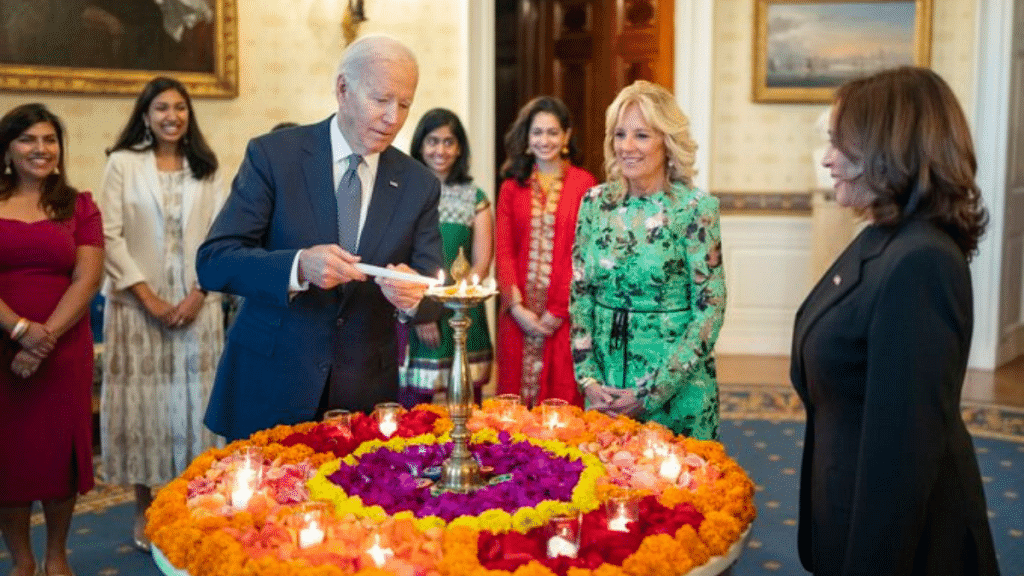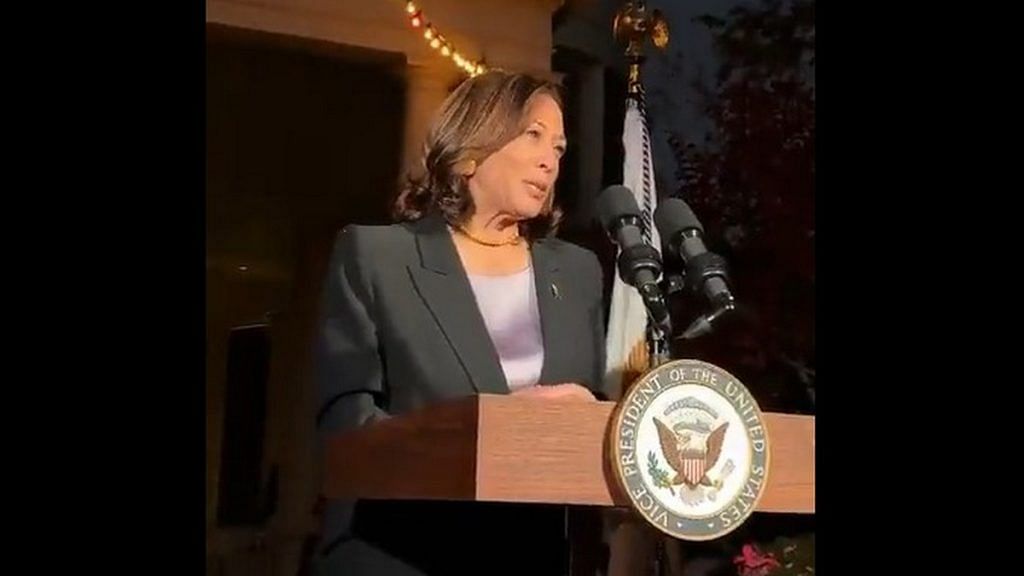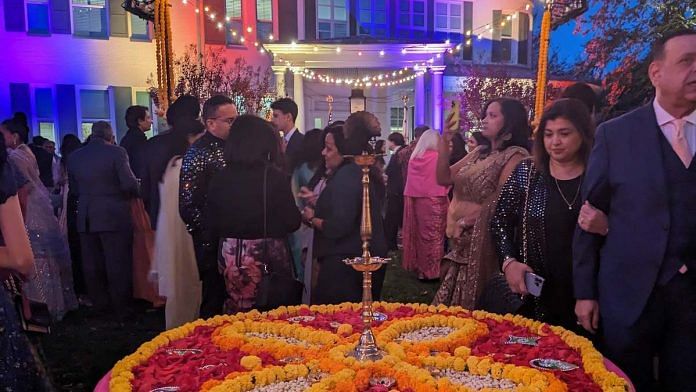The White House’s annual Diwali celebrations have, for many years, embodied the spirit of the festival of lights, serving as a moment of unity within the heart of American democracy. However, these celebrations have also been shadowed by a disconcerting pattern of exclusion of Dalits that can no longer be overlooked. It’s time to illuminate this dark chapter in the history of White House Diwali celebrations and call for transformative change.
Poet Rupi Kaur declined an invitation to the 8 November Diwali gala hosted by Vice President Kamala Harris because of the Joe Biden administration’s “support of the current atrocities against Palestinians”. In an Instagram post, she articulated that Diwali is more than just a festival of lights; it’s an occasion to reflect on the struggle for freedom against oppression.
Last year’s Diwali celebration hosted by the Bidens was one of the biggest ever at the White House, with more than 200 guests attending. President Biden himself lit the diya and spoke about the holiday’s significance. However, amid this grandeur, there was a glaring absence — the voices and presence of Ambedkarites or Dalits.
The 2023 Diwali event hosted by Harris continued this pattern of exclusion. This is particularly disconcerting given the Biden-Harris campaign’s emphasis on inclusivity and its framing of the election as a “battle for the soul of this nation. The lack of representation from the Dalit community at such events appears to be inconsistent with this message.
Also Read: SB 403 veto shows US needs to be cautious about Indian influence on its domestic policies
Exclusion in the White House & beyond
Dalits, historically marginalised and oppressed in India, have borne the brunt of caste-based discrimination and injustice. Dr BR Ambedkar, a prominent Dalit leader and the architect of the Indian Constitution, dedicated his life to fighting caste-based discrimination. His enduring legacy continues to inspire millions of Dalits. Yet, despite their significant contributions to social justice and human rights, Dalits have been noticeably absent from White House Diwali celebrations.
This exclusion is not limited to White House events but extends to various gatherings and networks where diversity and equitable representation should be paramount. The systemic underrepresentation of Dalits in these crucial spaces underscores the urgency for a comprehensive examination of prevailing dynamics and a resolute commitment to addressing these disparities.

For instance, the establishment of a new Congressional caucus focused on protecting the interests of Hindu, Buddhist, Sikh, and Jain Americans has sparked concerns among several South Asian American civil rights organisations.
While the caucus intends to advance the interests of these communities, there is a growing apprehension that it may inadvertently exclude marginalised groups, particularly Dalits and Ambedkarites, from significant dialogues and events. The creation of the caucus has also raised questions about the true purpose and inclusivity of such initiatives.
It has been argued that the caucus aligns with the Hindu nationalist agenda, and was formed without consulting the wider Indian-American community.
I am not just a concerned individual but also a dedicated fundraiser and registered bundler (fundraiser who collects campaign contributions from donors) for the Democratic Party.
I played a pivotal role in hosting the inaugural fundraiser for Biden’s presidential campaign, which was held at the Philadelphia residence of David Cohen, the American ambassador to Canada. This event was attended by a select group of 80 VIPs, making it a significant gathering within the context of the campaign.
Despite my active involvement in fundraising efforts and unwavering commitment to representing the voices and concerns of Dalits, I find them disregarded and sidelined at every step. This exclusion is largely because of the overwhelming dominance of ‘upper-caste’ individuals within the White House.
It’s worth noting that individuals like the Biden campaign donor Ajay Bhutoria and Ramesh V. Kapur, who lobbied for California Governor Gavin Newsom to veto the historic anti-caste bill in the state, have played a role in perpetuating this exclusionary narrative.
White House caste culture—starting with Harris
The exclusion of Dalits in the White House Diwali reception highlights deeply entrenched disparities. Those who are part of upper-caste circles receive preferential treatment, while Dalits are often left out in the cold. Why does this continue to happen, and why are Dalits consistently overlooked in events and gatherings that should celebrate diversity and inclusivity? It is crucial to address these questions and confront the uncomfortable truths that lie beneath the surface.
One plausible explanation for this exclusion is the overwhelming presence of dominant castes in positions of influence and power at the White House.
In the Biden-Harris administration, individuals with names like Gupta, Reddy, Ramamurthi, Raghavan, Verma, Chhabra, Agrawal, Shah, Patel, and Sharma hold significant roles in various appointee positions. While these individuals undoubtedly bring their own unique perspectives and talents, the preponderance of upper castes raises legitimate concerns about diversity and inclusivity.
Kamala Harris’s Tamil Brahmin heritage may have also subtly introduced aspects of Hindu caste culture into the White House.

While her mother benefited from Ambedkar’s advocacy for equal rights for women, Harris may have unintentionally overlooked his legacy.
Kamala Harris owes a debt of gratitude not only to Ambedkar but also to Mahatma Phule, the pioneer behind India’s first girls’ school. Without such educational opportunities, her mother’s journey to the US and Kamala’s ascent to Vice President would have been near impossible.
It’s not uncommon for politicians to lose sight of their roots once they assume positions of power, but in her role as Vice President, Harris must reflect on her personal journey and recognise the significant contributions of Ambedkar and the Ambedkarites in shaping her path to success.
The Biden-Harris administration should consider that there is more to the Indian American community than just the upper caste.
Discrimination in the diaspora
It’s not just the White House Diwali — over the past three decades in the US, Dalits have rarely been invited even by the Indian Embassy to celebrate Diwali. This exclusion serves as a stark reminder of the caste-based discrimination that continues to permeate diaspora communities and highlights the pressing need for change.
It’s vital to acknowledge that Dalits are a significant and integral part of the Indian diaspora in the US. They have made substantial contributions across various fields — including academia, activism, and the arts — but have been relegated to the margins despite that.
We must remember that when Dalits are consistently left out, it promotes social untouchability and sends a powerful message that their voices and contributions are not valued. Such instances show that the battle against caste-based discrimination transcends national boundaries and requires collective action on a global scale.
Also Read: BJP invokes Ambedkar for poll campaigns but Indian embassies don’t even display his portrait
Toward brighter Diwalis
It’s high time that Diwali celebrations, in the White House and beyond, embody the true spirit of the festival— of light, hope, and inclusivity. Diwali is a time when people unite to celebrate the triumph of light over darkness, good over evil, and knowledge over ignorance. It is a festival that should bring together individuals from all backgrounds, irrespective of their caste or heritage.
The Biden administration, which secured victory on the promise of diversity and inclusion, must adopt a proactive stance to address the exclusion of Dalits. It must ensure that every individual, regardless of caste or background, is granted equal opportunities and representation in these significant gatherings.
The White House Diwali celebration, in particular, should stand as a beacon of light. Vice President Harris, an Indian American herself, understands the importance of inclusivity. She has often shared how her maternal grandfather, PV Gopalan, emphasised treating everyone equally. The White House must align with these values and ensure Diwali celebrations genuinely reflect the festival’s spirit. This is about justice and equity, not just symbolism.
The exclusion of Dalits from White House events, particularly those celebrating Indian culture and heritage, is not just an issue of social justice. It is a reflection of the broader struggle against caste-based discrimination. It is an affront to the principles of equality and justice that the US upholds.
It sends a troubling message that discrimination and untouchability are tolerated, even in the highest echelons of American democracy.
It’s time to break the cycle of exclusion and illuminate the darkness of caste-based discrimination.
(Edited by Asavari Singh)



